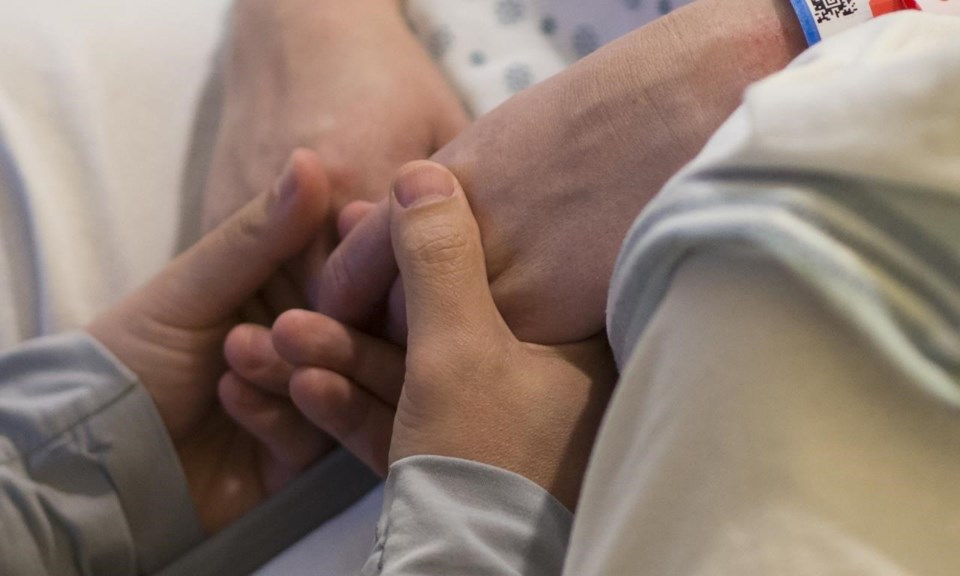ST. JOHN'S, N.L. — The same handful of doctors and nurse practitioners who helped introduce medically assisted death to Newfoundland and Labrador are handling the majority of a steadily increasing number of requests for the service — and they say they can no longer do it alone.
Applications for medically assisted death in the province are increasing year over year, outpacing the number of health-care workers available to assess those requests, said Dr. Aaron McKim, a family physician and the provincial health authority's chief of medical assistance in dying, or MAID.
"Last year was the first year we hit the wall, where a number of the practitioners who were our staunch go-tos came back and said, 'I can't do this for a while, I need to take a break,'" McKim said in a recent interview. "So we were getting requests for MAID, and we were having to tell people that we don't have anybody to be their MAID practitioner."
The situation became serious enough that in April, he told his colleagues in a briefing note that there were six people waiting to be assessed for MAID and that at least one patient had waited about five months for an evaluation.
Newfoundland and Labrador has had the lowest rate of medically assisted deaths in the country for the past four years, according to a report last month from Health Canada. About 1.5 per cent of the province's deaths in 2022 were doctor assisted, compared with a national average of about 4.1 per cent.
But in the province's eastern region, which includes the capital of St. John's and is home to roughly three-fifths of the provincial population, the number of people seeking medically assisted death climbed from 16 in 2019 to 107 in 2022, McKim said in his briefing note. There were 37 requests in the first quarter of 2023.
Each application for MAID must be evaluated by at least two assessors, who can be doctors or nurse practitioners. Seven medical professionals did 75 per cent of the primary assessments for all requests in the region between 2016 and Aug. 31, 2021, McKim's note said. Eight people did 76 per cent of the primary assessments in 2022.
McKim said this small core group of health-care workers has done the majority of MAID assessments and procedures in the region since the program began.
Nurse practitioners did assessments and provisions for free until July, when they struck a new collective agreement with the province, said a spokesperson for their union.
Newfoundland's eastern region includes dozens of small communities scattered along remote, rocky coastlines, and many don't have MAID practitioners, let alone nearby family doctors. McKim said members of that core group of MAID practitioners have driven for "hours and hours and hours" to these communities, "to allow somebody to have the option that they wanted."
The work can be emotionally taxing and some in that group were aiding "a dozen or two" assisted deaths each year, he added.
As of May 25, there were seven people in the region waiting for their applications to be fully assessed, officials said in an email. Three patients still needed two assessors and faced a wait time of up to 113 days.
Things had only improved slightly by early November, when McKim said there were "a couple of cases" without assessors.
The overwhelming majority of requests were for track-one medically assisted deaths, which are cases where a natural death is foreseeable.
Patients whose natural deaths are not reasonably foreseeable but whose condition leads to intolerable suffering can apply for a track-two assisted death. There were five track-two requests in the eastern region in 2021, and nine in 2022. Nine requests had been made between January and September.
MAID assessments include meeting with the patient, speaking with their care providers, examining the care options they've pursued and ensuring their application meets the federal guidelines. Track-one assessments take five or six hours, but track-two assessments can take "dozens" of hours, McKim said. Doctors in the province can only bill for up to five hours of assessment work, so they often end up doing the bulk of track-two assessments for free.
"It's essentially a volunteer thing. And it's a pretty tough role to do even when you're getting paid for it," he said, adding that he thinks more practitioners would take on track-two MAID assessments if they were properly compensated.
In an emailed statement, the province's Department of Health said it understands MAID access is important. Doctors' fees for assessments were negotiated with the province's medical association, it said.
Not all those seeking an assessment will ultimately want a medically assisted death, McKim noted. For example, there were 10 track-two assessments done in the year since Sept. 1, 2022, but no procedures. In that same period, there were 87 track-one requests and 46 provisions.
Sometimes simply being approved for MAID allows patients to feel more control after receiving a life-altering diagnosis, McKim said.
"This helps give people a bit of reassurance that if the suffering gets too bad, they have a back door," he said. "As a MAID practitioner, my goal is to be able to help somebody have a choice. And what they choose to do at the end of the day, that's up to them."
This report by The Canadian Press was first published Nov. 9, 2023.
Sarah Smellie, The Canadian Press



